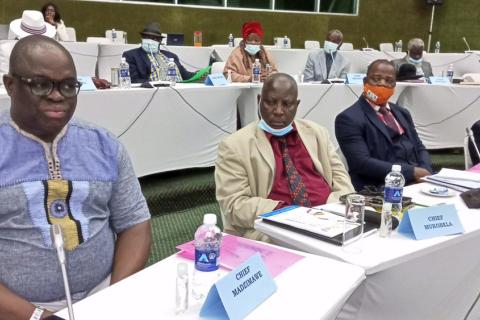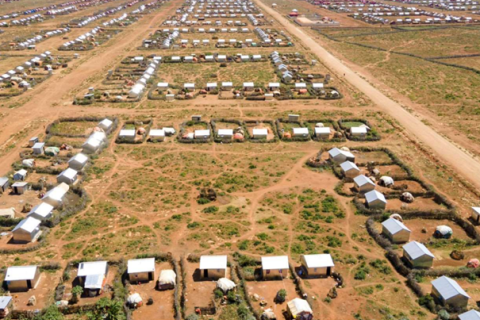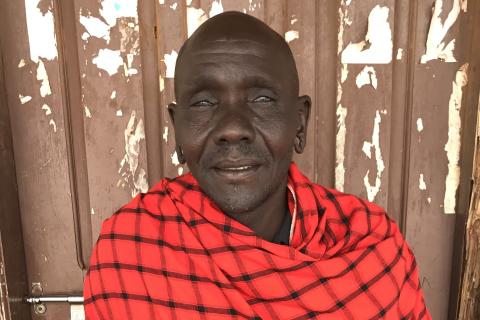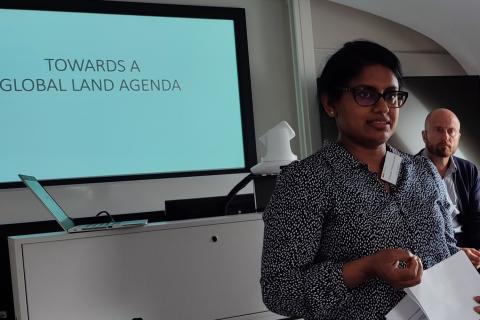Traditional authorities need a clearer role in land governance
Traditional authorities in Zambia complain that the government does not consult them when land is allocated for investment projects, while communities say chiefs are neglecting their interests. Jesinta Kunda of Zambia Land Alliance says more clarity is needed on the role of traditional authorities, in law and practice, to ensure large-scale investments in agriculture, mining and other sectors are governed better – particularly in light of the rising demand for critical minerals found in Zambia. She urges the government, traditional leaders and citizens to seize the opportunities presented by current legal reforms in Zambia to create change.
Understanding the link between Climate & LAND-at-scale country projects - Sustainable Solutions for Rural-Urban Migrants in Baidoa, Somalia
As part of a scoping study titled Land Governance for Climate Resilience: A review and case studies from LAND-at-scale projects headed by Richard Sliuzas, Emeritus Professor, University of Twente, IOM explored how climate plays a role in the UN-led Saameynta Joint Programme in Somalia. In this context, climate change is increasingly recognized as a multiplier of insecurity and fragility, where climate-related sudden and slow-onset disasters are driving people to leave their land and migrate. While migrating allows people to find alternative livelihoods and enhance their climate resilience, it can also be associated with instances of maladaptation to climate change. As such, this case highlights durable solutions in climate-driven urban sprawl in Baidoa.
People are hungry for this knowledge
By Peter Sangeyon, Gender and Land Champion, WOLTS Project Tanzania
From 1995 to 2005 I was the village chairman, and I was a ward councillor for ten years after that. I was very pleased when the community selected me to be a WOLTS gender and land champion.
Hacia una Agenda Global de la Tierra: Configurando el futuro de la Gobernanza de la Tierra
In a world grappling with numerous challenges related to climate change, socio-economic issues, and migration, the significance of land cannot be overstated. Land is not just a concern for the land community but for all communities, as it holds the potential to address critical global issues. Recognizing the need for a comprehensive approach to land governance, a global land agenda is being proposed. This blog explores the origins, objectives, and actions required to pave the way for effective land governance on a global scale.
Land registration and the local social contract
During the Annual Conference hosted by the Knowledge Platform Security and Rule of Law (KPSRL), the LAND-at-scale knowledge management organised a session exploring how land registration might impact relations between local governments and the populations they are expected to serve. Land registration interventions today often follow a path of decentralisation in which local land offices are tasked with additional responsibilities, or new entities are being created.
Recuento de seminario web: La Seguridad de Tenencia la Tierra Revisada
El 15 de diciembre de 2022, el equipo de gestión del conocimiento de LAND-at-scale organizó un seminario web sobre la seguridad de la tenencia de la tierra: ¿Sabemos lo que necesitamos saber? en el que se presentaron las conclusiones preliminares de un estudio sobre la seguridad de la tenencia elaborado por Guus van Westen y Jaap Zevenbergen. La presentación del estudio fue seguida de sesiones de trabajo sobre la seguridad de la tenencia y su relación con los derechos de la mujer a la tierra, el papel del Estado, los conflictos por la tierra y el desarrollo económico, facilitadas por expertos en tierras y panelistas que informaron al plenario sobre los debates con sus respectivas reflexiones sobre las conclusiones del estudio.
Seguimiento del impacto transformador de género de los programas de tierras
Para que las intervenciones en materia de gobernanza de la tierra sean equitativas y sostenibles, el papel de las mujeres debe pasar a primer plano de forma activa. Pero, ¿cómo se hace esto? ¿Y cómo se mide? Estas son las preguntas que se plantean en el programa LAND-at-scale.
10 Years Of VGGT – Time To Take Stock
This blog was written by Anna Schreiber and originally posted through Land for Life at https://land-for-life.org/10-years-of-vggt-time-to-take-stock/
Call for Papers: Building Power, Deepening Democracy: Global Perspectives on Environmental Justice
Submission Deadline: All manuscripts should be submitted for consideration by December 31, 2021.
The global environmental crisis is intertwined with the crisis of social and economic inequality. From coal plants to palm oil plantations, economic activities that threaten the planet are concentrated in communities with less power and wealth. “You can’t have climate change without sacrifice zones,” writes Hop Hopkins, “and you can’t have sacrifice zones without disposable people.”1
When South African law promotes unlawful land deals…
By Monica de Souza Louw, Land and Accountability Research Centre (LARC), University of Cape Town
* This piece was originally published as part of the online discussion on customary law in Southern Africa
Women’s Tenure Rights and Land Reform in Angola
By Allan Cain, Development Workshop Angola
* This article was originally published as part of the online discussion on customary law in Southern Africa







